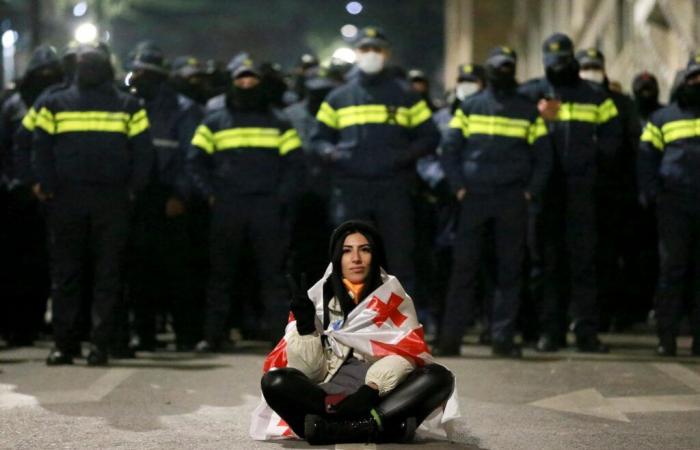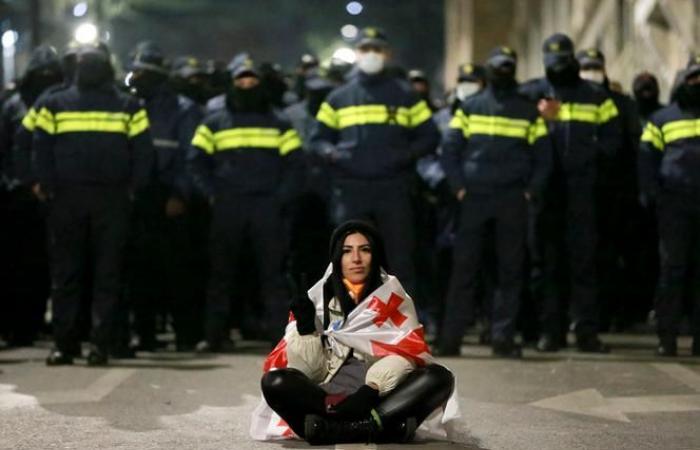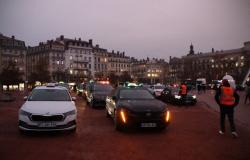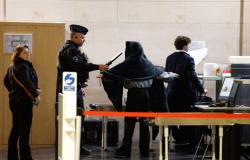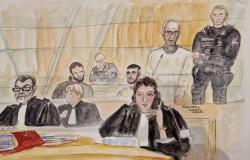The Georgian Prime Minister refused, Monday, December 2, any negotiations with the opposition, on the fifth day of a large-scale mobilization, punctuated by clashes, to demand new legislative elections and denounce the decision of the authorities to suspend the process of integration into the European Union.
By early evening, thousands of protesters gathered again in front of the Parliament building in Tbilisi, the capital. This place, a traditional gathering point, has become the epicenter of tensions between police and opponents.
The UN High Commissioner for Human Rights, Volker Türk, expressed his deep concern on Monday after the violence which punctuated the demonstrations in recent days, denouncing a use “disproportionate force” against the protesters.
Irakli Kobakhidze assured that his government would do « maximum d’efforts » to integrate the country into the European Union, even though he himself announced last week that he was suspending the accession process, provoking these large-scale protests. “No negotiations” with the opposition, he decided. At a press conference, he also raised the specter of outside interference, maintaining that the protests were being financed “from abroad”. At any rate, “there will be no revolution in Georgia”at-il having you.
The Georgian Dream party, in power since 2012 and accused by its opponents of a pro-Russian authoritarian drift, triggered this mobilization on Thursday by postponing all integration negotiations into the European Union until 2028. Yet this objective is so precious that it is enshrined in the Constitution of this former Soviet republic. This movement takes place while the authority of the Georgian Dream is highly contested by the opposition, who accuse it of having ” stolen “ the legislative elections of October 26.
The Georgian Dream often takes Ukraine, invaded by Russian troops for almost three years, as a counterexample. Its officials accuse the West of wanting to drag Georgia into a war with Russia. In this logic, Kremlin spokesperson Dmitry Peskov drew a parallel between the situation in Georgia and the Maidan revolution in Ukraine in 2014.
“Another impressive night”
Monday morning, the pro-Western president, Salomé Zourabichvili, breaking with the government but with very limited powers, estimated that the mobilization was not weakening. “Another impressive night during which Georgians firmly defended their Constitution and their European choice”she wrote on the social network
The Memorable World
Test your general knowledge with the editorial staff of “Le Monde”
Test your general knowledge with the editorial staff of “Le Monde”
Discover
On Sunday evening, for the fourth night in a row, tens of thousands of demonstrators gathered waving European flags until late in Tbilisi and other cities. The situation became tense in the evening around Parliament. Demonstrators threw fireworks into the building and at the police, who then used water cannons and tear gas to disperse them.
Since the start of the rallies, several dozen people – demonstrators, journalists and police – have been injured, sometimes seriously, according to both camps, even if the exact number has not been clearly established. In total, 224 people have been arrested since Thursday, the Interior Ministry said. The demonstrators accuse the police of violence against them. “They are angry, they beat us, they spray us” more « our mistake »Lika, 18, said on Sunday as police tried to disperse the crowd.
Lithuania, Latvia and Estonia announced on Monday that they had sanctioned Georgian figures responsible, according to them, for having violated human rights during the demonstrations. A spokesperson for German diplomacy, for his part, assured that the door to the European Union remained open to Georgia and called on the government to support this path.
Slogans hostile to Russia
On Monday, strikes in solidarity with demonstrators began in schools, public institutions and businesses, according to national media. Lacha, a 35-year-old striking professor seen in demonstrations on Sunday, claimed that it was“a symbolic act of resistance”.
Georgians march for the European Union, as well as against neighboring Russia, with the crowd regularly chanting slogans hostile to Moscow. The country nestled on the shores of the Black Sea remains traumatized by the Russian invasion of 2008, during a brief war. Russia then recognized the independence of two separatist Georgian regions bordering its territory, Abkhazia and South Ossetia, where Russia still maintains a military presence.
Georgia has been going through a political crisis since the announcement of the victory, later contested, of the Georgian Dream in the October elections. Despite accusations of irregularities, the government has ruled out organizing a new vote.
The Georgian demonstrators received support from the United States, Ukraine and the European Union, which notably denounced the use of force by the police. Georgia officially obtained candidate status for membership in the European Union in December 2023, but Brussels has since frozen the process, accusing the executive of carrying out a serious democratic step backwards.

